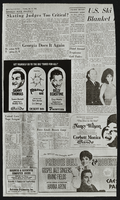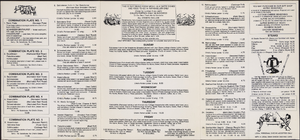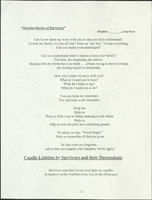Search the Special Collections and Archives Portal
Search Results

Cecia Alvarado oral history interview: transcript
Date
Archival Collection
Description
Oral history interview with Cecia Alvarado conducted by Barbara Tabach on September 15, 2020 for the Latinx Voices of Southern Nevada Oral History Project. Cecia describes her personal history, moving to the United States as a teen in the year 2000. She talks of immigration, education, and her work as the State Director of "Mi Familia Vota."
Text
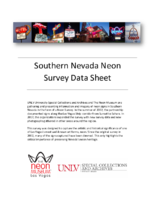
Aruba Hotel (Thunderbird) Neon Survey document, August 30, 2017
Date
Archival Collection
Description
Site name: Thunderbird Hotel and Casino (Las Vegas, Nev.)
Site address: 1215 S Las Vegas Blvd
Sign owner: 1215 Las Vegas Blvd LLC; C.F. Saticoy, LP
Sign details: The building was constructed in 1964 (Assessor). A vintage postcard from 1967 shows the Lotus Inn Motel and a Sambo's restaurant (VintageVegas.com, 2017). The hotel was renamed the Monte Carlo Inn in 1979, but reverted in the 1980's to the Lotus Inn (VintageVegas, 2017). In 1985, it became the Tally Ho (VintageVegas). Casino owner Bob Stupak renamed it the Thunderbird in 1986 or 1987 (VintageVegas). Stupak proposed building 15-story, $400 million resort hotel called the Titanic on the site, but vocal opposition from residents of the nearby John S. Park neighborhood and a trademark controversy derailed the project (Knightly, 2014). The property was renamed the Aruba Hotel in the early 2000's and became the Thunderbird in 2016 (O'Brien, 2016; VintageVegas). As of April 2017, a 15-story residential building was planned for the site (Carter, 2017).
Sign condition: Condition is 5, excellent. The lower portion of the sign is wrapped in plastic. The exposed upper portion of the sign shows the cabinet, paint and neon all in new condition. All of the neon tubes are intact and functioning.
Sign form: Blade
Sign-specific description: The lower portion of the rectangular metal cabinet is wrapped in black plastic. "THUNDERBIRD" is spelled out in white blocks and red serif letters which run vertically down both sides of the plastic wrap. The upper portion of the cabinet is exposed. The cabinet is topped by a bird shape facing the street. The bird and visible part of the rectangular cabinet are painted forest green. Both sides of the bird are covered in white, blue, pink, yellow and green skeleton neon. Underneath the bird , a horizontal yellow skeleton neon tube is visible.
Sign - type of display: Neon
Sign - media: Steel
Sign environment: Las Vegas Blvd north of the Strip. Property is surrounded by other motels and wedding chapels.
Sign - date of installation: c. 2007
Sign - thematic influences: Tropical, Caribbean and Old Vegas. The parrot on top of the sign closely resembles the symbol of the former Thunderbird hotel on the Las Vegas Strip. The property has used the Thunderbird name intermittently since the 1980's, even when it was the Aruba hotel and the word "THUNDERBIRD" appeared over an "Aruba" sign. (Vegas24Seven, 2012)
Survey - research locations: Assessor's website
Survey - research notes: Carter, J. (2017 April 27). Fights are brewing over a proposed 15-story building downtown. Las Vegas Weekly. Retrieved from https://lasvegasweekly.com/intersection/2017/apr/27/fights-are- brewing-over- proposed-building- downtown/ Knightly, A. M. (2014 August 31). A history of landmarks never built. Las Vegas Review Journal. Retrieved from https://www.reviewjournal.com/news/a-history- of-landmarks- never-built/ O'Brien, J. (2016 January 21). Thunderbird Hotel reopening with former Arts Factory owner at helm. Retrieved from http://vegasseven.com/2016/01/21/thunderbird-hotel- reopens/ http://www.vegas24seven.com/substance-cd- release-sinicle- the-great- circuiting-mechanical- death-a- sinners-confession- at-the- aruba-hotel- saturday-june- 30th/ Vegas24Seven.com. (2012). Substance CD Release, Sinicle, The Great Circuiting, Mechanical Death, A Sinners Confession at The Aruba Hotel Saturday June 30th . Retrieved from Vintage Vegas. (2017 February 16). Archive: Lotus Inn Motel, c. 1967. Retrieved from http://vintagelasvegas.com/post/157345077754/lotus-inn- las-vegas Zeitzer, I. (2007 June 29). On The One, The Aruba Hotel " Las Vegas, NV- 6/22. Retrieved from http://www.jambands.com/reviews/shows/2007/06/29/on-the- one-the- aruba-hotel- las-vegas- nv-6-22#ixzz4rBUwxlkh
Surveyor: Mitchell Cohen
Survey - date completed: 2017-08-30
Sign keywords: Blade; Neon; Steel
Text
Homer Rissman Architectural Records
Identifier
Abstract
The collection is comprised of architectural records (1947-2001) of American architect, Homer Rissman and the architectural firm, Rissman and Rissman Associates Ltd, a partnership of Homer Rissman and his brother Marshall. The collection includes 825 items from over 40 major projects and over 110 minor projects. The Rissmans' work represented in the collection focused on Las Vegas, Reno, and Lake Tahoe, Nevada, Los Angeles, Southern California, and Arizona, with Homer's early career design work in Chicago, Illinois. The materials feature hand-drawn architectural drawings, ranging from pencil and ink on tracing paper preliminary sketches to ink on Mylar (TM) construction documents, and a number of artist’s renderings, used for presentations and promotional materials. The drawings also contain work from a number of consultants, engineers, and other architects who collaborated on the development of the various projects. The collection includes architectural drawings for: hotels, casinos, integrated casino resorts, office towers, multi-family residential developments, and custom single-family homes.
Archival Collection
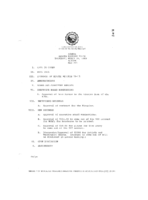
Meeting minutes for Consolidated Student Senate University of Nevada, Las Vegas, March 30, 1989
Date
Archival Collection
Description
Text
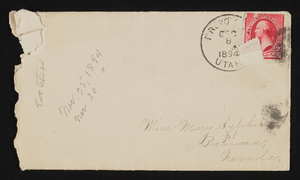
Letter and envelope from Annie Ronnow, Provo, Utah. to Mary Etta Syphus, Panaca, Nevada
Date
Archival Collection
Description
From the Syphus-Bunker Papers (MS-00169). The folder contains an original handwritten letter, an envelope, a typed transcription of the same letter, and a copy of original letter attached.
Text

Transcript of interview with Marion Brooks by Kathleen Kasmir, February 24, 1975
Date
Archival Collection
Description
On February 24, 1975, Kathleen Kasmir interviewed Marion Brooks (born 1913 in Santa Ana, California) about his life in Southern Nevada and his work as a mining engineer. Brooks first talks about his background before talking extensively about his early work in mining. Brooks also mentions some of the professional mining societies of which he was a part, and the two then move on to discuss gambling, recreational activities, and the atomic testing. Other topics covered during the interview include the price of groceries and food, the El Rancho Vegas, social changes, population growth, and environmental changes. The end of the interview then shifts back to Brooks’ work in mining at Blue Diamond and then a discussion on the possible locations of three lost mines.
Text
Richard and Sheilagh Brooks Papers
Identifier
Abstract
The Richard and Sheilagh Brooks Papers (1919-2003) are comprised of materials collected during their tenure as professors of Anthropology and Archaeology at the University of Nevada, Las Vegas (UNLV). Included are correspondence, research papers, photographs, reports, books, article reviews, and student scholarship. There is also a file on reburial issues that contains correspondence and an amendment to Nevada State law regarding the handling of exhumed bodies.
Archival Collection

